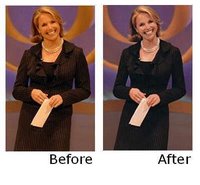 The always-wonderful Today in Literature has an interesting entry today on the monumental article "Hiroshima" published on this date, in its entirety, by The New Yorker magazine in 1946.
The always-wonderful Today in Literature has an interesting entry today on the monumental article "Hiroshima" published on this date, in its entirety, by The New Yorker magazine in 1946.Long a fan of the period between the wars (roughly 1918-1946), and a great fan of fellow journalists, I had heard about John Hersey's legendary article for years. I did not actually find and read it until just this year -- when I borrowed the Complete New Yorker that I bought Matt for his birthday.
I think what makes it work so well is the slow, determined pace that Hersey uses to introduce the story, the survivors he interviewed, the sights and sounds he experienced. It is certainly not for the faint of heart; but it is dramatic and compelling in its "You are there" story-telling quality.
If you are any kind of fan of excellent writing then this article is a must read. I could not find the complete text online, but the article is available in book form here.



